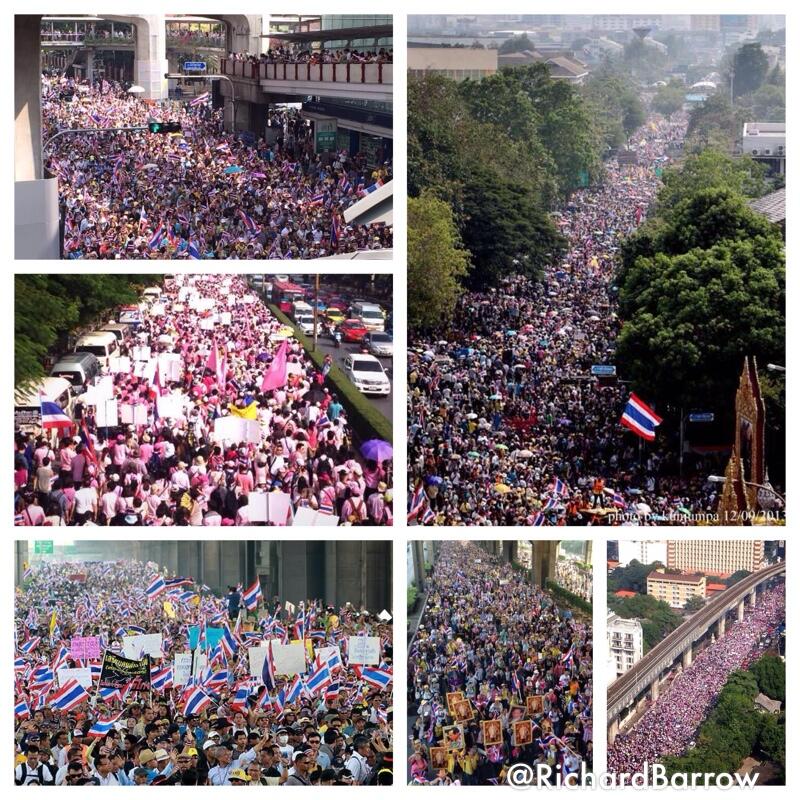More than 125,0oo people took to Bangkok’s streets on Monday as the political climate in Thailand continues to shift…
To our Journeys Within guests,
Our team would like to keep you updated on the ongoing situation in Bangkok.
After the city’s streets calmed for the King’s birthday on Dec. 5, protesters redoubled their efforts to rid the country of Yingluck and the political influence of her family on Monday with about 150,000 opposition supporters hitting the streets.
Despite causing major traffic jams across the city, Monday’s protest remained peaceful as the large gatherings made their way to the Government House on Nakhon Pathom Road, where they are expected to spend the night.
Looking to quell the ongoing demonstartions, Prime Minister Yingluck Shinawatra dissolved parliament and called fresh elections early Monday morning. Stepping down as Prime Minister, Yingluck is likely to be the Puea Thai party’s candidate in the upcoming election, which is expected to be held in early February.
This call for elections, not otherwise scheduled until 2015, was wholly rejected by the protest leaders who have proposed an unelected “people’s council”.
Protest leader Suthep Thaugsuban, a former deputy prime minister, has been called a contradictory and unpredictable figure by Southeast Asian analysts who criticize his unwillingness to accept a new election as being undemocratic.
The political conflict largely pits Bangkok-based middle class and elites backed by the military against rural and working-class voters loyal to former prime minster Thaksin — a polarizing figure who was ousted by the military and later convicted of corruption.
The result of this latest development has yet to be seen, as the opposition (ironically called the Democrat Party) must decide whether to take part in next year’s elections and also how to direct its thousands of followers.
What is clear is that the political situation in Thailand is complex and continuing to evolve. This new wave of protests remains peaceful and the government remains committed to not escalating the situation by using unarmed police.
Looking to ensure the safety of all our tours, the Journeys Within ground team continues to monitor the situation closely and will do our best to keep our guests informed. Right now all our tours are able to continue as planned and we are working with our guides and hotels to make sure guests know about any changes and tours are adjusted if and when necessary.
So what are these protests about?
Other than calling for the end of ‘Thaksin rule’ and the immediate resignation of his sister, the current Prime Minister, Yingluck Shinawatra, it isn’t entirely clear what the protesters are after. The leader of the anti-government rallies, Suthep Thaugsuban, claims that the protests are a show against corruption and nepotism, as well as a move to replace the government with a people’s council — though details regarding its hypothetical composition are scarce.
A controversial figure, Yingluck’s brother and previous Prime Minister Thaksin has been a dividing figure in Thailand since his election in 2001. He implemented policies that were largely aimed at Thailand’s rural northern provinces where support for the current prime minister remains strong. In 2006 Thaksin was deposed by the military in a bloodless coup. The prime minister’s ousting led pro-Thaksin ‘red-shirts’ (supporters wearing red) to protest in 2010 — rallies against military involvement in politics and widespread economic inequality. These gathering eventually led to clashes with the military and ended in violence.
Now those protesting are opponents of Thaksin and Yingluck. This round of protests was initially sparked by a controversial bill that could have granted amnesty to Thaksin and his cronies who were convicted of corruption years earlier. They have been living abroad in self-imposed exile ever since.
Both parties have stated that they don’t want the country’s political tug-of-war to escalate or to dissuade tourists from visiting. None-the-less, the political tension has prompted travel updates from more than 30 foreign governments. Among the countries warning their citizens to be vigilant and to avoid getting too close to the protests are the UK, the U.S., Canada, Australia, Germany, Sweden and Singapore.




